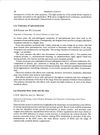 23 citations,
August 1987 in “Australasian Journal of Dermatology”
23 citations,
August 1987 in “Australasian Journal of Dermatology” Older adults in Ottawa commonly have skin conditions like sun damage, dry skin, and hair loss.
 10 citations,
November 2018 in “Genetics in medicine”
10 citations,
November 2018 in “Genetics in medicine” Lack of cystatin M/E causes thin hair and dry skin.
 8 citations,
October 2013 in “The Journal of Spinal Cord Medicine”
8 citations,
October 2013 in “The Journal of Spinal Cord Medicine” Most spinal cord injury patients in Korea experience skin problems, especially fungal infections and eczema, affecting their quality of life.
 16 citations,
February 2019 in “Pediatric Blood & Cancer”
16 citations,
February 2019 in “Pediatric Blood & Cancer” Most children with CNS tumors on targeted therapy had skin reactions, which were generally treatable without stopping the therapy.
 August 2023 in “American Journal of Hospice and Palliative Medicine”
August 2023 in “American Journal of Hospice and Palliative Medicine” People in palliative care often have skin problems due to their main illness or other health issues, and treatments focus on comfort and quality of life.
 17 citations,
July 2014 in “Our Dermatology Online”
17 citations,
July 2014 in “Our Dermatology Online” Older adults have a wide range of skin conditions, with dry skin being very common and many also experiencing skin growths, itching, and infections.
 1 citations,
January 2015 in “Springer eBooks”
1 citations,
January 2015 in “Springer eBooks” Chemotherapy can cause skin side effects that affect patients' lives, but they can be managed to avoid interrupting cancer treatment.
 1 citations,
June 1987 in “British journal of dermatology/British journal of dermatology, Supplement”
1 citations,
June 1987 in “British journal of dermatology/British journal of dermatology, Supplement” Most patients tolerated spironolactone for acne and hirsutism despite common side effects like menstrual changes and breast tenderness.
 June 2020 in “IP Indian journal of clinical and experimental dermatology”
June 2020 in “IP Indian journal of clinical and experimental dermatology” Older people more commonly have skin conditions related to aging, and early treatment can improve their quality of life.
 September 1998 in “Journal of The European Academy of Dermatology and Venereology”
September 1998 in “Journal of The European Academy of Dermatology and Venereology” Older people often have untreated genital skin diseases due to embarrassment and lack of medical attention, which can lead to discomfort and even cancer risk.
3 citations,
January 2012 in “Journal of cosmetics, dermatological sciences and applications” Many Iraqi patients had skin problems at the site where a vein was taken for heart surgery.
 December 2023 in “Clinical Cosmetic and Investigational Dermatology”
December 2023 in “Clinical Cosmetic and Investigational Dermatology” An 8-year-old Saudi boy was diagnosed with a rare genetic disorder causing hair loss, skin issues, and light sensitivity.
 24 citations,
March 2007 in “International Journal of Dermatology”
24 citations,
March 2007 in “International Journal of Dermatology” The Arabic Skindex-16 is a reliable and valid way to measure the impact of skin conditions on quality of life in Saudi patients.
 9 citations,
February 2022 in “Dermatology and therapy”
9 citations,
February 2022 in “Dermatology and therapy” An emollient PLUS balm with ADE-G1 significantly improved skin dryness and quality of life in cancer patients with xerosis.
 4 citations,
March 2002 in “Journal of the American Pharmaceutical Association”
4 citations,
March 2002 in “Journal of the American Pharmaceutical Association” The conclusion is that pharmacists are important in helping women choose the right skin care treatments.
 28 citations,
December 2006 in “Clinical lung cancer”
28 citations,
December 2006 in “Clinical lung cancer” Early recognition and management of skin side effects from new cancer therapies can prevent treatment delays.
 18 citations,
January 2017 in “Postępy Dermatologii i Alergologii”
18 citations,
January 2017 in “Postępy Dermatologii i Alergologii” EGFR inhibitors can cause various skin issues during cancer treatment, and managing these is important for patient care.
 January 2023 in “Revista da Associação Médica Brasileira”
January 2023 in “Revista da Associação Médica Brasileira” Brazilian patients with inflammatory bowel disease have a high rate of skin problems compared to healthy people.
 34 citations,
April 2008 in “Journal of the European Academy of Dermatology and Venereology”
34 citations,
April 2008 in “Journal of the European Academy of Dermatology and Venereology” Skin problems like itching, dry skin, and hair loss are more common in hepatitis C patients after interferon treatment, but lichen planus is not linked to the infection.
 138 citations,
February 2007 in “European journal of cancer”
138 citations,
February 2007 in “European journal of cancer” EGFR inhibitors often cause skin problems and other side effects, but these are usually reversible and can be managed to keep patients comfortable.
 28 citations,
January 2006 in “Journal of agricultural safety and health”
28 citations,
January 2006 in “Journal of agricultural safety and health” Most Latino farmworkers in the study had skin diseases, with fungal infections being the most common.
68 citations,
January 2014 in “Dermatology research and practice” Skin side effects from cancer drugs targeting EGFR can affect treatment adherence but can be managed with antibiotics like tetracycline.
 5 citations,
February 2021 in “Dermatology and Therapy”
5 citations,
February 2021 in “Dermatology and Therapy” Platelet-rich plasma mesotherapy improved symptoms in patients with corticosteroid-induced rosacea-like dermatitis.
 January 2021 in “Erciyes medical journal”
January 2021 in “Erciyes medical journal” The COVID-19 pandemic changed the types of skin conditions seen at a clinic, with fewer patients and varying numbers of specific conditions.
 22 citations,
September 2015 in “Clinical lymphoma myeloma & leukemia/Clinical lymphoma, myeloma and leukemia”
22 citations,
September 2015 in “Clinical lymphoma myeloma & leukemia/Clinical lymphoma, myeloma and leukemia” Recognizing and treating skin symptoms in essential thrombocythemia is crucial for patient quality of life.
 38 citations,
February 2012 in “Supportive Care in Cancer”
38 citations,
February 2012 in “Supportive Care in Cancer” Skin problems like acne, dry skin, and nail and hair changes are common in patients taking EGFR inhibitors.
 24 citations,
July 2011 in “PubMed”
24 citations,
July 2011 in “PubMed” Thyroid hormones affect skin texture, hair and nail growth, and can cause skin diseases related to thyroid problems.
 67 citations,
September 2003 in “Journal of cutaneous pathology”
67 citations,
September 2003 in “Journal of cutaneous pathology” Skin problems are very common in people with end-stage kidney disease.
 11 citations,
March 2016 in “Journal of the European Academy of Dermatology and Venereology”
11 citations,
March 2016 in “Journal of the European Academy of Dermatology and Venereology” Almost all patients with chronic kidney disease not yet on dialysis have at least one skin problem.
 December 2024 in “Nutrients”
December 2024 in “Nutrients” Skin, hair, and nail changes can help detect eating disorders early.




























